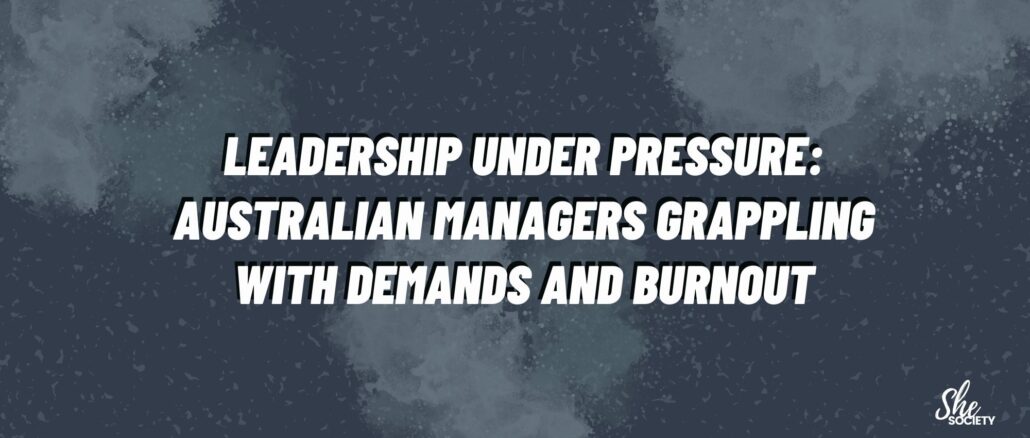
Recent research has brought to light that a considerable number of managers (66%) are struggling with burnout because of the escalating demands of the workplace, particularly due to their role. Unfortunately, this alarming trend extends to their employees with almost two thirds (62%) of employees experiencing burnout also; showing that Australian employees surpass the global average of 48%. Effective leadership in the workplace cannot be overstated. The well-being and success of a company’s employees and subsequently, the company itself, depends on a leader’s ability to shoulder responsibility and guide their team through the workplace and industry challenges to achieve favourable outcomes.
In this growing business landscape that is becoming increasingly competitive, a manager’s ability to adapt with it to support their workplace and achieve success is significant. To further discuss these business trends and how managers can use their skills to encourage change, SheSociety spoke to CEO of Jetts Fitness, Elaine Jobson. Elaine has achieved an impressive 23-year journey in the fitness industry, and has travelled across the world to do so from Africa to Malaysia, before finding her niche here in Australia. With a diverse experience in the workplace under her belt, Elaine is a trailblazer in the industry, having just been awarded Executive of the Year at the Fit Summit 2023 Awards of Excellence. She had many insights to give into managers and employees struggling with high demands and burnout.
- What do you believe are the key elements in creating a healthy and innovative business culture that foster success and productivity?
“In my experience, the most successful business cultures have a clear vision on what they’re working towards and how each staff member can actively attribute to this. It’s crucial for the executive team to keep lines of communication open and foster a supportive environment – especially in stressful times. Provide employees with autonomy, encourage collaboration, and embrace a culture of learning and experimentation and you’ll foster a healthy workplace.
2. What do you believe are the key tools and strategies for conflict resolution in the workplace, particularly from a managerial perspective?
“Conflict in the workplace can be the death of any business no matter how great they are. Conflict resolution demands a thoughtful and strategic approach, particularly from those in charge. Active listening skills allow managers to comprehend the underlying concerns of conflicting parties – and its important employees feel listened to and understood.
Empathy plays a crucial role in understanding diverse perspectives and facilitating a constructive dialogue. Implementing effective communication strategies, mediating conflict promptly, and encouraging a culture of respect and understanding are essential tools for resolving conflicts and maintaining a harmonious work environment.“
3. How can managers create a culture that supports the well-being and growth of their employees?
“Businesses always underestimate the pivotal role managers play in creating cultures. Managers need to value their employees time and adopt the attitude that sometimes work doesn’t always come first. Offer flexible working arrangements and encourage time management practices that promote their overall well-being.
Investing in professional development opportunities, such as training programs and mentorship initiatives foster employee growth and cultivates a sense of purpose in the team. I have found that if managers actively recognise and appreciate employee contribution, this will reinforce their engagement and job satisfaction, nurturing a supportive and growth-oriented culture. “
4. What strategies can managers implement to encourage diversity and inclusion in the workplace?
“Promoting diversity and inclusion in the workspace requires a proactive approach. The executive team can implement strategies such as diversifying recruitment efforts, establish mentorship programs and ensure equitable opportunities for advancement. However, all these things are very well said and done, but nothing changes unless the business is mindful and active in their approach. Creating a culture that celebrates diverse perspectives and fosters inclusive communication channels needs to be in the everyday practice of a business.“
5. What are the unique challenges that, in your experience, you find women face in the workplace and how do you help them overcome these challenges?
“In my experience, women in the workplace encounter unique challenges that require focused attention and support. These challenges may include unconscious bias, gender stereotypes, and limited representation in leadership roles. Particularly in the fitness industry – which can be quite a male dominated space – finding women in leadership and executive roles is less common. To overcome these obstacles, management can provide clear progression pathways, programs that upskill their workers and advocate for equal opportunities.”
6. How can managers ensure a healthy work-life balance for their team members, particularly for women juggling multiple responsibilities?
“Happy, healthy team members are the key ingredients to successful businesses. Managers can promote work-life balances by offering flexible scheduling options, facilitating remote work arrangements where feasible and fostering attitudes that value personal well-being.
It’s important right off the bat, to establish clear expectations with your employees – as long as they meet these expectations or articulate when they cannot. Employees should be able to balance work and life how they’d like to, particularly if they’ve got multiple responsibilities in the home.
On the flip side, it’s important for the executive team to lead by example. So, to all those managers who are workaholics, remember to set work boundaries with yourself, leave on time, show when life can come first and when work can take a back seat, and demonstrate to your team how to balance this effectively.
7. How do you define taking your team to the next level, and what are your steps to achieving this?
“Taking the team to the next level involves inspiring and empowering individuals to surpass their own expectations. This requires setting challenging yet attainable goals, providing the necessary resources and training, and creating a culture of innovation, collaboration, and continuous improvement. By encouraging a growth mindset, nurturing talent, and recognising achievements, managers can propel their team towards greater success and excellence.”
8. What does it mean to you taking out Executive of the Year, for the Fit Summit 2023 Awards of Excellence?
“Winning Executive of the Year is an accumulation of hard work and testament to the collective effect of my team at Jetts Fitness! It signifies the recognition of the hard work, dedication, and achievements that we’ve made within the industry. This award inspires us to continue pushing boundaries, driving for positive change and to commit to excellence with our clients and team.”
SheSociety is a site for the women of Australia to share our stories, our experiences, shared learnings and opportunities to connect.



Leave a Reply